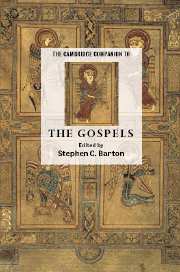Book contents
- Frontmatter
- Introduction
- Part I Approaching the gospels: context and method
- Part II The gospels as witnesses to Christ: content and interpretation
- Part III The afterlife of the gospels: impact on church and society
- 10 The gospels and the development of doctrine
- 11 The gospels embodied: the lives of saints and martyrs
- 12 Praying the gospels: spirituality and worship
- 13 Living the gospels: morality and politics
13 - Living the gospels: morality and politics
from Part III - The afterlife of the gospels: impact on church and society
Published online by Cambridge University Press: 28 January 2007
- Frontmatter
- Introduction
- Part I Approaching the gospels: context and method
- Part II The gospels as witnesses to Christ: content and interpretation
- Part III The afterlife of the gospels: impact on church and society
- 10 The gospels and the development of doctrine
- 11 The gospels embodied: the lives of saints and martyrs
- 12 Praying the gospels: spirituality and worship
- 13 Living the gospels: morality and politics
Summary
Does Jesus speak to matters that are public and political, or is his teaching directed solely to the individual believer? This question has become harder to answer in the modern world. Or, to put it better, such a question has become possible only in the modern world. The distinction between the public and the private that many today take for granted has its history in the rise of the modern secular nation and the demise of the church's political power. In the modern west, religion tends to fall on the 'private' side of the divide, while politics names the 'public' realm in which varieties of rights and interests are weighed and evaluated. Ethics continues to be invoked as both a private and a public matter, but it is generally agreed that, in order for ethics to become public ethics, all religious content must be evacuated. Only in this way, it is argued, could an ethic be binding for a religiously diverse population. While one might respect the desire to create a political body that can foster a unity of purpose across religious boundaries, the public/private split has tended to fragment our most basic human questions. 'How are we to live together?' (a political question) is separated from 'What is the good that we should pursue?' (an ethical question), which, in turn, is separated from 'Where do we come from and where are we going?' (a religious question). This tendency to fragment the human quest makes it difficult sometimes to understand the biblical world in which politics, religion and ethics are unapologetically intertwined in the pursuit of God and the good.
- Type
- Chapter
- Information
- The Cambridge Companion to the Gospels , pp. 264 - 283Publisher: Cambridge University PressPrint publication year: 2006



